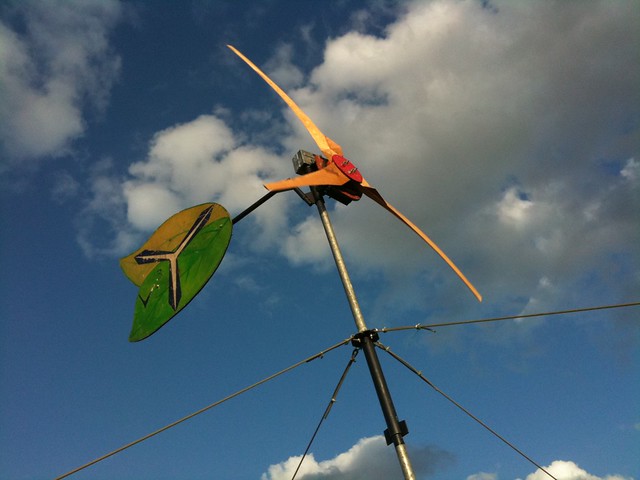 |
| One of the wind turbines used to power the Climate Camp on Blackheath |
I live in Blackheath in South East London and this weekend Climate Camp conveniently parked itself about a half hour walk from my doorstep. In among the climate activism classes there was a ~1.5hr wind turbine workshop which I attended on Saturday afternoon - much of the camp's power has come from a couple of turbines which charge numerous 12V batteries for distribution throughout the camp (Blackheath's very windy). There were also a few static bicyles which provided power by energetic cyclists.
The workshop was packed and I thought it was a really nice example of public engagement with engineering - the people leading the workshop were engineering students (postgraduate) and took the crowd through the principles of how turbines work including wind velocity, drag, torque, rotor blade profiles, magnets, copper coils, currents, voltage and where to find instructions to build one as well as online communities of like minded turbine fans to help you along the way. A lot of the material used came from skips (apparently university engineering department skips are fantastic) even though it's still not cheap to build one in terms of either time (a few hours to carve just one of the rotors) and money (one of the turbines cost around £400 for the parts that didn't come from skips such as magnets and copper coiling for the rotor and the metal braided cables used as guy ropes).
We didn't get to take a wind turbine home with us after school (they're quite large) but I chatted to the people running the course and asked them if, in addition to attending eco-type festivals, they'd ever done anything at the science festivals - I must say I'd be delighted to see them doing workshops at science festivals (assuming it could be accommodated). They haven't, but have done workshops with school pupils doing woodwork classes (the rotors in the models they demonstrated are hand carved) and metalwork etc.
The people behind the workshop are V3power and their website is http://www.v3power.co.uk/ - they use designs from Hugh Piggott, whose website is http://www.scoraigwind.com/. He has written 'A wind turbine recipe book' http://www.scoraigwind.com/axialplans/recipecontents.htm
The writer of a local blog, the Blackheath Bugle, has written a post about the turbines with a couple of pictures of their set up http://blackheathbugle.wordpress.com/2009/08/27/build-a-wind-farm-on-blackheath/
At the end of the session (there were a lot of interesting questions and answers) a few of us helped in getting the turbines up and vertical again which was a lot more exciting than you might imagine.
Of course, now I'm wondering what it would take to turn one of those children's windmill toys into something that could power an LED...
See also the write-up of the post-camp residents' discussion: Climate Camp - Blackheath / Lewisham / Greenwich residents' meeting (19 September 2009) - I learned a bit about effects of camps on wildlife directly (canvas over ground) and indirectly (police surveillance equipment, apparently).




